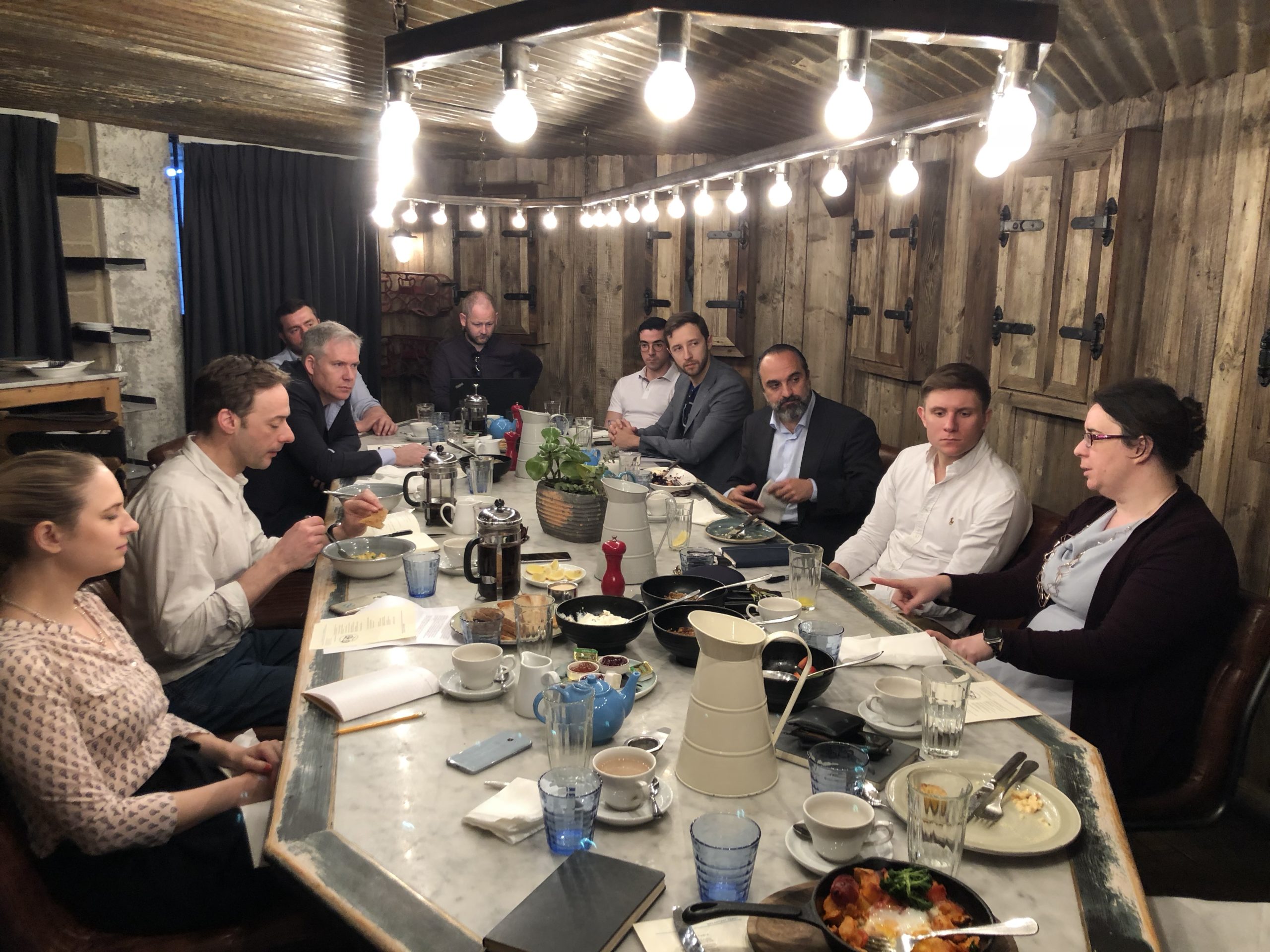Once again Ammonite hosted our monthly round-table ‘Leaders in Data’ discussion over a (partly keto friendly!) breakfast at the Riding House Café, skilfully chaired by the delightful Janet Bastiman.
Our ‘leaders’ this month were;
- Chair –Janet Bastiman, Chief Science Officer @ StoreyStream.
- Carla Raven, Head of Data & Insights @ Share Creativ
- Sam Aberman, Director – Product Management & Data Science @ Operative
- Pawel Krzysztofik, Head of Data Science @ Infosys
- Dr Simon Wallace, Director of Data Strategy & Implementation @ Mindshare
- Richard Marshall, Project Manager @ Hiscox
- John Vernan, Data Science Manager @ Veolia UK.
- Adam Davison, Head of Insight & Data Science @ The Economist
- Premal Desai, Director, Data Strategy @ Consultant
- Antoine Clais – Head of Data Science @ Voltaware
- Host – Phil Marks, Director @ Ammonite
- Host – Keith Robinson, Director @ Ammonite
Below is a summary of the main points of our discussion about the 2 challenges posed;
1. How to manage expectations of ‘the business’ & Data Science?
There is a misunderstanding between data science & the business. It’s pretty universal across all business areas and industries. Gaining a common understanding with business is difficult & would benefit from a more personal approach. Some difficulty arises from the fact that many senior people are under the impression that data science is a ‘magic wand’ and that (hiring) data scientists will provide the answers to perpetual growth. For data scientists the hype surrounding their field is a double-edged sword.
So … the business needs to be educated about what data science can and can’t accomplish BUT data scientists also need to understand the business and how to apply what they have modelled to create real business value. There is still a question mark around the value add to date.
How to go about educating …
- Make sure business feels that they are part of the solution.
- Educate explicitly and as simply as possible regarding both the pros and cons of data science and what data scientists can do for the business.
- At the same time, at the right level of hierarchy, a full explanation of what insights show and how the model is working is also required.
- Storytelling is a powerful tool that many data scientists need to get better at.
- Senior management need examples of models / solutions that work for them to increase their confidence to address the business about what data science is up to and the benefits to come.
- It’s important to create a safe environment where business people don’t feel foolish asking questions about data science, models, outcomes.
- Part of the answer is to educate data scientists about how to talk to the business.
Gaining the confidence of the business …
- Start with business people who are excited about data science and use them as evangelists.
- Clearly explain and explore how advanced analytics can help ‘traditionalists.’ Human involvement plus data science is the optimum. Be realistic and balanced about what the future might hold for them.
- Start a business conversation with “what can we do to help?”. However, recognise that they don’t know what they don’t know, therefore first understand their business and their data.
- Based on business needs, manage business expectation by delivering products all along the journey. If C-levels see regularly delivery, they will understand little by little the data science processes & workflows.
- When delivering, apply the “who gives a f*ck?“ test to the solution you are working on.
2. Hiring, Engagement & Retention of Data Scientists
Hiring good data scientists is, in itself, problematic. Skills required and expectations on both sides of the hiring table are shifting. Once hired, maintaining data scientists’ engagement and ultimately retaining their services is also a challenge. Achieving optimum results requires some adjustment in expectation and attitude.
Hiring the right candidate …
- Involve the wider business at interview stage.
- Hire candidates who are able to explain something technical to non-technical people.
- When recruiting ask the candidate to explain the algorithm. They need this practical, lower level of understanding.
- It’s becoming apparent that people are more frequently recruiting lower level data practitioners and upskilling them. Much of the work of a data scientist is basic. Often a data analyst with the ability to learn is a better hire.
- Recruit both excellent communicators (storytellers) and fantastic techies in your team. Both are required to create business value.
Manage expectations …
- Accept that data scientists will leave in 2 years BUT make sure they feel valued to help keep them for as long as possible. Potentially accept that people will leave no matter what you do.
- Engage data scientists by making them feel important and connected to the products.
- Educate data scientists more about the business and what they are trying to solve.
- Show data scientists that senior people in the business are interested in what they do. Make them feel valued. Ask what would make their job easier.
- Record meetings with the business as a learning exercise for data scientists.
- As part of their ongoing education and development, get data scientists to explain problems to the business.
- 3 suggestions for deeper engagement;
- 10% of the time spent on cutting edge challenges (AI lab).
- Uni collaboration on white papers.
- Create a “marketplace” of interesting problems to solve.
But protect the business …
- Accepting that there is a high churn of data scientists, the business must be protected for that eventuality;
- Ensure they document and explain their models and code. “If you can’t repeat your experiments you’re a data hacker, not a data scientist”.
- Encourage collaboration and integration to ensure it’s possible to cover their work.
- Potentially utilise data science team management software.
- Incorporate Microservices – easier to replace in part.
A lively debate with everyone contributing and, from the feedback received, some key takeaways for all participants. Once again, as a Director of Ammonite, hosting these monthly events we continue to add to our library of information that we draw on when recruiting and mentoring our clients in the data space.

